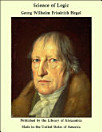The Phenomenology of Mind: Volume 1
Φεβ 2006 · The Phenomenology of Mind Βιβλίο 1 · Cosimo, Inc.
3,0star
1 κριτικήreport
ebook
448
Σελίδες
family_home
Κατάλληλο
info
reportΟι αξιολογήσεις και οι κριτικές δεν επαληθεύονται Μάθετε περισσότερα
Σχετικά με το ebook
A sweeping investigation of how knowledge is obtained by means of absolute truth, including how the spirit reveals itself as absolute reality, The Phenomenology of Mind is an intellectual tour-de-force and represents a great philosophical works for the ages. Originally published in English in 1910, Hegel proffers his unique viewpoint that knowledge is not separated from, nor outside of, absolute reality - but that knowledge is itself reality, and posits that reality is mental and spiritual. Volume I includes: .On Scientific Knowledge in General .Intention and Method of the Argument of the Phenomenology .Consciousness and Self- Consciousness .[The Nature of] Free Concrete Mind: Reason Also Available from Cosimo Classics: Hegel's The Phenomenology of Mind: Volume II German philosopher GEORG WILHELM FRIEDRICH HEGEL (1770-1831) was born in Stuttgart and studied at Tbingen, where his contemporaries included Schelling and the poet Hlderlin. As a philosophical disciple of Kant, Hegel was of the Idealist School of philosophers and remained an unparalleled influence on German philosophy throughout the 19th-century. Additional works by Hegel's include: The Objective Logic (1812-13), The Subjective Logic (1816), Encyclopedia of the Philosophical Sciencies in Outline (1817), and Philosophy of Right (1821).
Βαθμολογίες και αξιολογήσεις
3,0
1 αξιολόγηση
Σχετικά με τον συγγραφέα
Born the son of a government clerk in Stuttgart, Germany, George Wilhelm Friedrich Hegel received his education at Tubingen in theology. Arguably the most influential philosopher of the nineteenth century, Hegel's lectures---most notably at the University of Berlin from 1818 to his death---deeply influenced not only philosophers and historians but generations of political activists of both the Right and Left, champions of the all-powerful nation-state on the one hand and Karl Marx on the other. His lectures at Berlin were the platform from which he set forth the system elaborated in his writings. At the heart of Hegel's philosophy is his philosophy of history. In his view, history works in a series of dialectical steps---thesis, antithesis, synthesis. His whole system is founded on the great triad---the Idea as thesis, Nature as antithesis, and the Spirit as synthesis. The Idea is God's will; Nature is the material world, including man; Spirit is man's self-consciousness of the Idea, his coming to an understanding of God's will. The formation over time of this consciousness is History. Spirit does not exist in the abstract for Hegel, but is comprehended in "peoples," cultures, or civilizations, in practice states. Hegelian Freedom is only possible in organized states, where a National Spirit can be realized. This National Spirit, a part of the World Spirit, is realized in History largely through the actions of World Historical Individuals, heroes such as Napoleon, who embody that Spirit. A profound misunderstanding of this doctrine led many German intellectuals to subvert it into a narrow, authoritarian nationalism that glorified the "state" as an end in itself. Although Hegel saw his philosophy as universal, applicable throughout the world, the focus and inspiration of his thought was European. And in his own even smaller world, he was content to support and work for the Prussian state, which he believed to be the highest development of history up to that time.
Αξιολογήστε αυτό το ebook
Πείτε μας τη γνώμη σας.
Πληροφορίες ανάγνωσης
Smartphone και tablet
Εγκαταστήστε την εφαρμογή Βιβλία Google Play για Android και iPad/iPhone. Συγχρονίζεται αυτόματα με τον λογαριασμό σας και σας επιτρέπει να διαβάζετε στο διαδίκτυο ή εκτός σύνδεσης, όπου κι αν βρίσκεστε.
Φορητοί και επιτραπέζιοι υπολογιστές
Μπορείτε να ακούσετε ηχητικά βιβλία τα οποία αγοράσατε στο Google Play, χρησιμοποιώντας το πρόγραμμα περιήγησης στον ιστό του υπολογιστή σας.
eReader και άλλες συσκευές
Για να διαβάσετε περιεχόμενο σε συσκευές e-ink, όπως είναι οι συσκευές Kobo eReader, θα χρειαστεί να κατεβάσετε ένα αρχείο και να το μεταφέρετε στη συσκευή σας. Ακολουθήστε τις αναλυτικές οδηγίες του Κέντρου βοήθειας για να μεταφέρετε αρχεία σε υποστηριζόμενα eReader.








